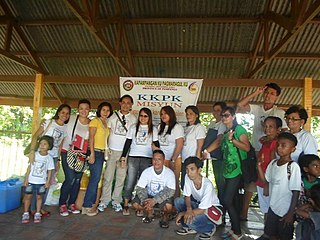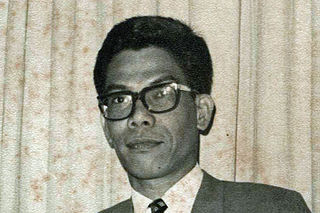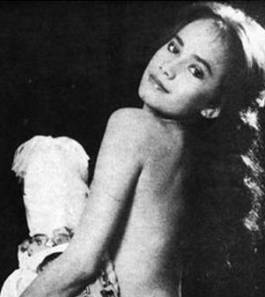
Maria Corazon Sumulong Cojuangco Aquino, popularly known as Cory Aquino, was a Filipina politician who served as the 11th president of the Philippines, from 1986 to 1992. Corazon Aquino was the most prominent figure of the 1986 People Power Revolution, which ended the two-decade rule of President Ferdinand Marcos and led to the establishment of the current democratic Fifth Philippine Republic.

Pasay, officially the City of Pasay, is a 1st class highly urbanized city in the National Capital Region of the Philippines. According to the 2020 census, it has a population of 440,656 people.

Kristina Bernadette Cojuangco Aquino, better known by her screen name Kris Aquino, is a Filipina TV host, actress, producer, product endorser and businesswoman.

Epifanio de los Santos Avenue, commonly referred to by its acronym EDSA, is a limited-access circumferential highway around Manila, the capital city of the Philippines. It passes through 6 of Metro Manila's 17 local government units or cities, namely, from north to south, Caloocan, Quezon City, San Juan, Mandaluyong, Makati, and Pasay.

The Kapampangan people, Pampangueños or Pampangos, are the sixth largest ethnolinguistic group in the Philippines, numbering about 2,784,526 in 2010. They live mainly in the provinces of Pampanga, Bataan and Tarlac, as well as Bulacan, Nueva Ecija and Zambales.
LVN Pictures, Inc. is a Filipino film studio that was considered one of the biggest in the history of Philippine cinema and its foremost establishment in motion picture post-production until 2005. In its heyday of motion picture production, LVN Pictures has been compared to that of the Metro-Goldwyn-Mayer Studios (MGM) of Hollywood because it had, under contract, the biggest stars and film craftsmen of the period. This was the oldest living film studio in the Philippines running for 68 years.Topic Users
Alberto Pineda Martinez is a Filipino actor, director, and producer.
Capital punishment in the Philippines specifically, the death penalty, as a form of state-sponsored repression, was introduced and widely practiced by the Spanish government in the Philippines. A substantial number of Filipino national martyrs like Mariano Gómez, José Burgos, and Jacinto Zamora, Thirteen Martyrs of Cavite, Thirteen Martyrs of Bagumbayan, Fifteen Martyrs of Bicol, Nineteen Martyrs of Aklan and Jose Rizal were executed by the Spanish government. The Spanish practiced widespread and systematic summary executions a dozen to 19 at any given time to ensure tyranny and repression in the Philippines.
Annabelle Huggins is a retired Filipino actress. In 1964 she starred alongside Jack Nicholson in Back Door to Hell, and later became famous when she was kidnapped by jeepney driver Ruben Ablaza.

Guillermo Cruz de Vega, nicknamed Gimo, was a Presidential Assistant of Philippine President Ferdinand E. Marcos with the rank of Cabinet Secretary. He was assassinated on October 27, 1975 while working at his office at the Malacañan Palace, the site of the President’s residence and office complex.

Teodoro "Teddy Boy" Lopez Locsin Jr. is a Filipino politician, diplomat, lawyer, and former journalist serving as the Secretary of Foreign Affairs since October 2018. He was a member of the House of Representatives from 2001 to 2010, representing the 1st district of Makati and later served as the Philippine Ambassador to the United Nations from 2017 to 2018. He was the host of the editorial segment titled "Teditorial" for ANC's nightly newscast The World Tonight.

Benigno "Ninoy" Aquino Jr., a former Philippine senator, was assassinated on Sunday, August 21, 1983, on the tarmac of Manila International Airport. A longtime political opponent of President Ferdinand Marcos, Aquino had just landed in his home country after three years of self-imposed exile in the United States when he was shot in the head while being escorted from an aircraft to a vehicle that was waiting to transport him to prison. Also killed was Rolando Galman, who was falsely accused of Aquino's murder.
1993 in the Philippines details events of note that happened in the Philippines in the year 1993.
Ram Revilla, born Ramgen Jose Magsaysay Bautista and also known as Ramgen Revilla, was a Filipino actor best known for his roles in various Filipino television series including his role as Jeff Gatdula in Tonyong Bayawak. Revilla was murdered on October 28, 2011. He was declared dead on arrival at the Parañaque Medical Center after being shot and stabbed in their family residence. There is no clear evidence about the gunman or the mastermind.

Delia Dueñas Smith, better known as Pepsi Paloma, was a Filipino-American dancer and actress in the Philippines. She was one of the popular Softdrinks Beauties introduced in the 1980s along with Sarsi Emmanuelle and Coca Nicolas. She was known for films such as Brown Emanuelle (1981), The Victim (1982), Krus sa Bawat Punglo (1982), Virgin People (1983), Snake Sisters (1983), Naked Island (1984), Matukso kaya ang Anghel? (1984) and Room 69 (1985).

The Philippine drug war is the anti-drug policy and actions of the Philippine government under President Rodrigo Duterte, who assumed office on June 30, 2016. According to former Philippine National Police Chief and Senator Ronald dela Rosa, the policy is aimed at "the neutralization of illegal drug personalities nationwide".

Pamilya Ko is a 2019 Philippine drama television series broadcast by ABS-CBN. Directed by Raymund B. Ocampo, it stars Sylvia Sanchez, JM de Guzman, Arci Muñoz and Joey Marquez. The series aired on the network's Primetime Bida evening block and worldwide via The Filipino Channel from September 9, 2019 to March 13, 2020, replacing Minute to Win It: Last Tandem Standing.

The good conduct time allowance (GCTA) controversy started in August 2019 involving the employees of the Bureau of Corrections (BuCor). It begins with Bureau of Corrections Director General Nicanor Faeldon and several other government officials signing the document containing the release of former Calauan, Laguna Mayor Antonio Sanchez, the prime suspect in the rape and murder of Eileen Sarmenta and her friend Allan Gomez in 1993, and the release of Josman Aznar, Ariel Balansag, Alberto Caño and James Anthony Uy, the 4 suspects in the rape and murder of sisters Marijoy and Jacqueline Chiong in 1997, citing "good conduct."
The Maggie de la Riva Story is a 1994 Filipino drama thriller film written and directed by Carlo J. Caparas. The film stars Dawn Zulueta in the title role, along with Miguel Rodriguez, John Regala, Michael de Mesa, Ricky Davao in supporting roles.
Maggie de la Riva, a 24-year-old actress and host, was abducted in front of her home in New Manila, Quezon City on 26 June, 1967 by four men, all of who are sons of influential families, and taken to a motor hotel where she was abused and raped.











